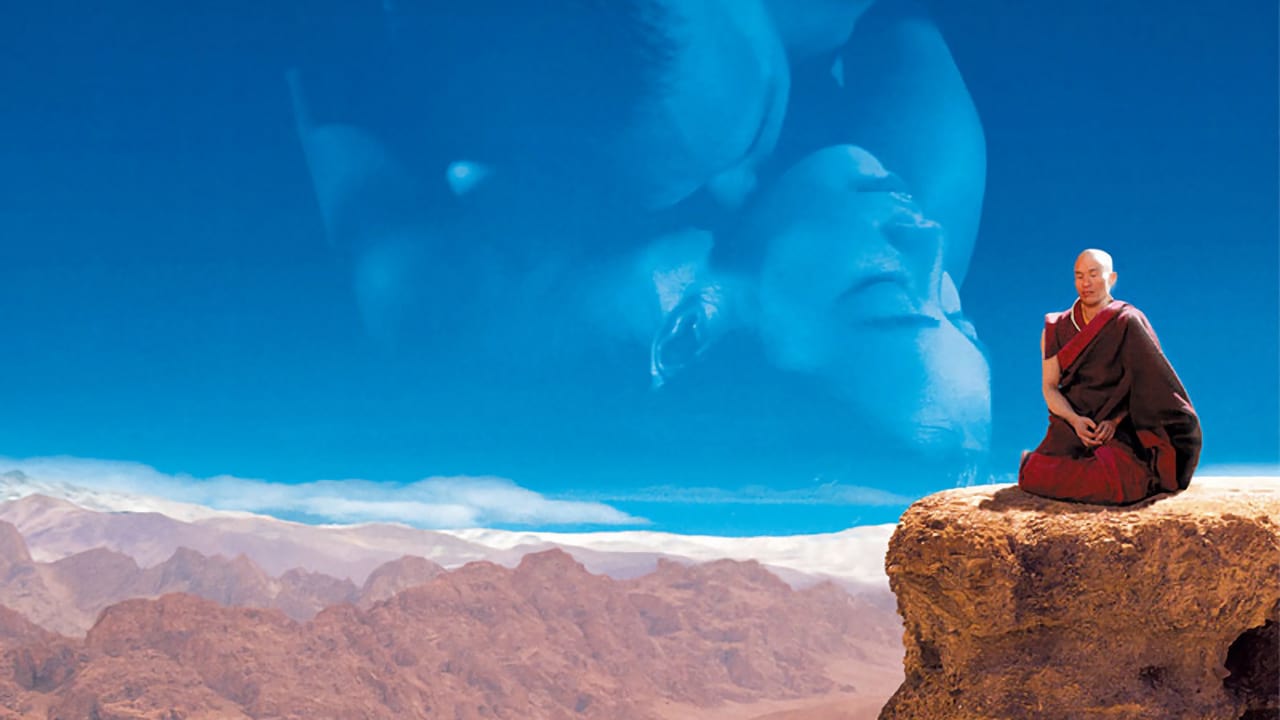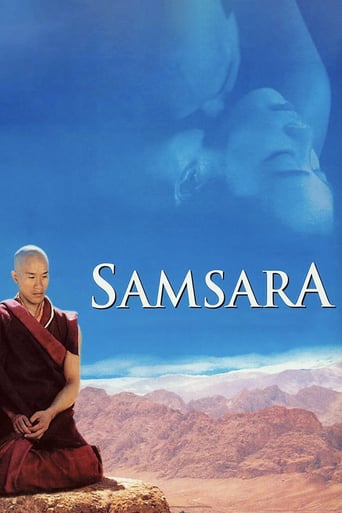



recommended
Charming and brutal
The film's masterful storytelling did its job. The message was clear. No need to overdo.
View MoreThe tone of this movie is interesting -- the stakes are both dramatic and high, but it's balanced with a lot of fun, tongue and cheek dialogue.
View MoreWe are all little drops of water and our destiny is to merge with the ocean, but, meanwhile... we can do a lot of things, we have a material life! That sounds great! Do a lot of sins, uncountable mistakes every day, big ones from time to time, concerning friendship choices, direction choices, work choices, love and sex choices, food choices, marriage choices...Some of us just look further, they are in a higher place, the Himalayas. They are able to look at the planet from its highest point. Sounds like a top accomplishment in physical life, takes a lot of spirit, but doesn't change our fate, neither our nature. As this story tells us, this special situation actually brings us closer to what we really are or are willing to be: defiant life, children in the universe, playing with gods and God, sewing provocations, conflicts and challenges, because as carnal life we become so unstable, unhappy and unquiet.This misfortune of suffering in life - the material life - turns out to be a paradox, because it's also our primary source of pleasure and happiness. It's kind of a disgrace, pretty much describes human adventures around here..., while we quietly start missing a perfect life, the eternal life that only our spirit knows. We tend to live by the instincts of the ego. It's attractive! Ego thinks as if it were the center of the universe. Physical life is all we've got, so let's go and get it, before someone else does! But inside we're evaluating and searching for better answers.On our most primeval basis we live on the instincts of our ego and all we want is to seek the biggest or wildest forms of Earth pleasures, then we get stuck in all conflicts this attitude produces. This circle of secular life we are imprisoned in is called Samsara, by the Buddhist. This life in between while we are learning the ultimate truth of life, evolving from a physical to a spiritually based life. We will always have a body in this planet, or in this dimension, but our mind can learn through the errors of our material desires and experiences. Conflicts cannot be overcome until we make some better choices out of the problems we have. And that'd be the way, the direction of our spiritual life towards Nirvana.In this movie we can see all the rebuilding of a different culture, where landscape, rhythms, preoccupations, all of them are so different from our usual life, but not the essential conflicts, they are all there, reproduced in the ascetic and very frugal eastern life of the Himalaias. A monk, practically a young Lama, Tashi, barely comes back from 3 years, 3 days, 3 months and 3 weeks of complete and almost impossible meditation, locked inside a cavern, and comes back to life with a very weird behavior, some kind of scandal in his community, because he starts to miss the most basic thing of material life: he starts to desire women and to dream of them, and it gets worse when he meets Pema, because then a love story begins.That's a big disappointment for his masters and he is sent back to secular life, for a proof of his true wishes and calls. That brings together the whole chain of conflicts we the ordinary people have. Notice that in this particular prism there are no powerful, rich our famous people, everyone is ordinary because they live by their ambition and greed and expectations. We have to get used to this different rhythm and language of the East, the way the story has to be told, the whole scenery, so we can think about a possible or not possible balance in our life. Everybody has its karma, so it's a different answer to each one of us.In this story we can see also other problems, like male and female basic attitudes and visions, basic relation problems among people, families, couples and lovers. The market competition, the love dispute, the inner doubts, the reactions and answers we usually give or not. A silent battle between ego and spirit that dominates our mind all the time; the choices we must make and the understanding we should learn. But this challenge of existence is given to us also through a female view, the perspective of Yoshadara, the wife of Sidarda, the prince who became the Buddah, and that comes from Pema, the female character.If we cannot find the balance of our life and find our answers we will be back to try again, that's Samsara, if we don't reach Nirvana; a beautiful movie and an a very good idea for discussion. Are we ready to go straight to the "ocean"? Can we reach Nirvana without doing everything we have to do in Samsara? Would life have any meaning if we didn't have our mistakes to learn from them? Should we just embrace our carnal life and bring it to all extremes, forgetting all about essence, spirit and evolution of our souls and hearts?
View MoreThis movie is merely a postcard for the Himalaya. Ladakh is a beautiful place which is currently spoiled by tourism. This movie shows it as an exotic paradise for monks, but has nothing to do with any life on this earth. the seducing concept 'the monks who breaks his vow for the worldly life' sounds like an appealing advertisement concept, to please the western audience in search of some wise spiritual adventure... How can one base a movie, a 'story', to express a message. It's so obvious, and doesn't give any space to the audience ; perhaps the director thinks most of the people are dumb and need a lesson about life. When I see that, I'm just feeling insulted, and sad to see all this money spoiled... The director didn"t take act of the responsibility that he had by deciding to build up this exotic story which gives a wrong impression of what is buddhism, Ladakh and being a monk. If at least there was an artistic interest, a cinematic point of view, but here, nothing, no trace of cinema, only a photographed story... To give an example of a movie which a complete mind-blowing movie experience, I think the movie 'Why did Bodhidharma leave for the east ?" gives it with a huge respect to its audience.
View MoreI loved everything about this movie, the story, the acting, the scenery and the love scenes. The raw passion that Tashi's character exudes throughout the movie and the tenderness that is Pema's character moved me.The ending was one of the best I've seen in any movie. The poignant and piercing questions that Pema asks reminded me of a monologue from a Indian art-house film from the eighties called "Nikaah". The monologue (at the start of the movie) so eloquently spells out the plight of women throughout history.The scene where the Sujatha lures Tashi, stands out in my mind as being very very sexy.
View MoreI found this movie, a very interesting and meaningful. There were not more than 100 words went on in this movie but the picture itself, gave the viewer many things to think about. What Tashi really did was reversing the Buddha path. Buddha was the one normal human being before he realize the need to discover what life is all about, what he discovered was suffering in living one life. He tried to find the ways to settle with all the suffering, not by avoiding but realize that there are suffering and and he faced it in the noble way.Tashi, however, live his life in the monastery, believe in something he was told to believe not something that he discovered himself. Every human has the feeling of sexual awakening at one point of time, what Tashi did was that he quit the monk-hood, partly because the guiltiness of having such feeling but at the same time desire to discovered the reality for himself. HE entered into the life and began to discover with all the truth in the world, full with desire, anger, jealously, deception etc. but at the same time he discover love, caring, warmth, and happiness. The decision he chose, for me, he was running away from suffering by going back to peace and serenity of being monastery. What he did was not totally right or totally wrong but it does suggesting something. HE is avoiding all the desire that always backfire him throughout the movie. Pema came to him and enlighten him with her thought. Enlightenment does not mean that you have to quit all the normal life and being alone in the temple to cut all the desires. Maybe what make you enlightened is the fact that you stay in life and faced the suffering in the acceptable noble ways. Maybe it is satisfy most of the need but at the same time conquer your own self.
View More